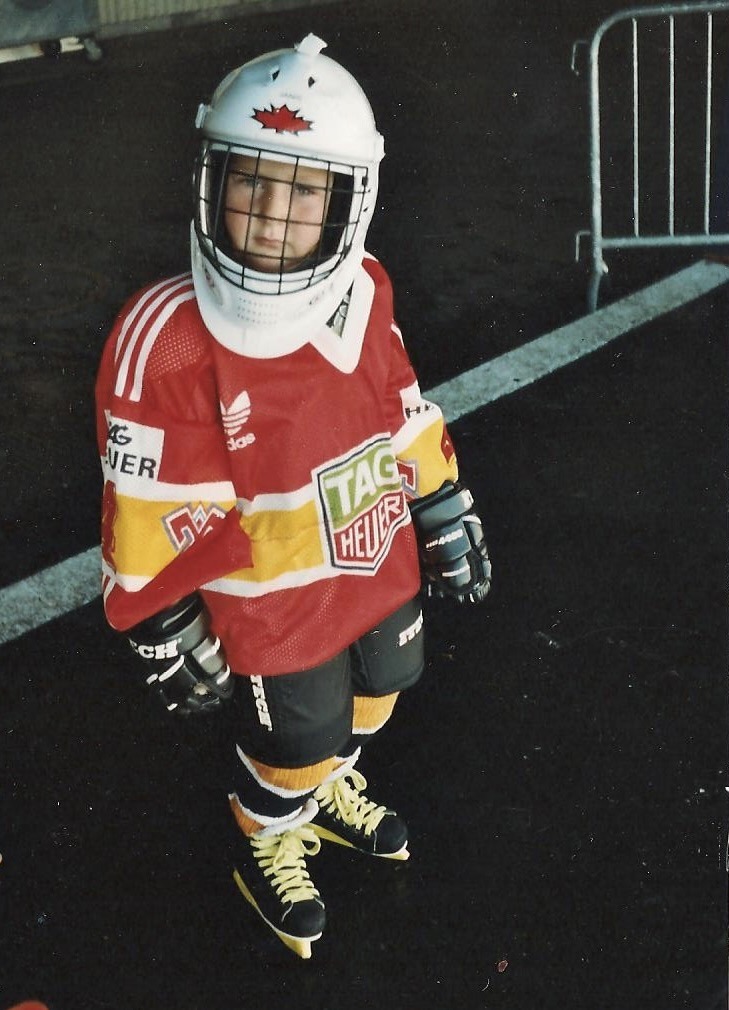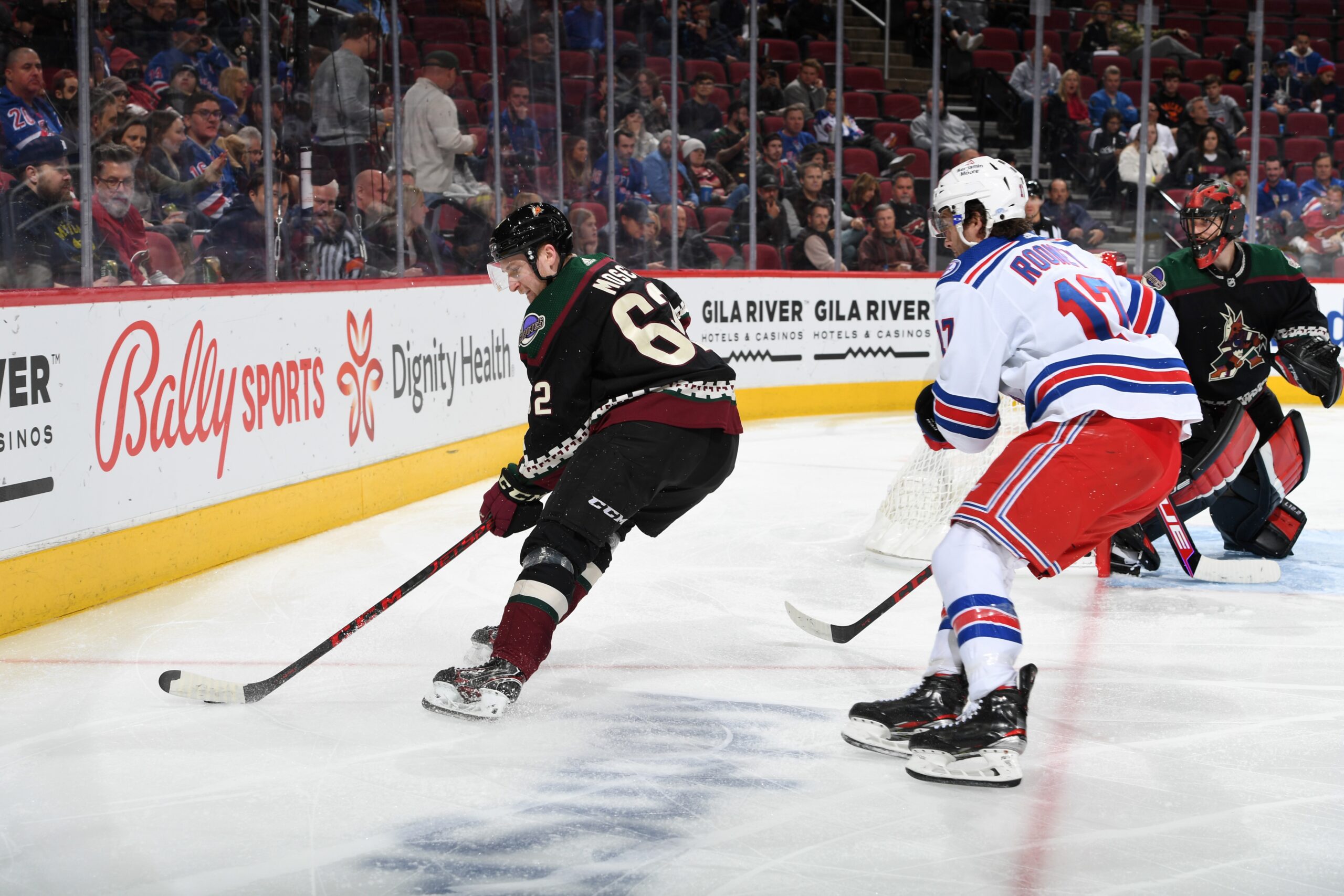© 2025 ALLCITY Network Inc.
All rights reserved.

Biel/Bienne GM Martin Steinegger had just settled into his bed after the long bus ride home from a Swiss league game at Ambrì-Piotta. That’s when an alarm went off on his phone, notifying him that somebody had broken into the team’s rink.
Janis Jérôme Moser couldn’t sleep after that same road trip. He couldn’t stop thinking about missed scoring opportunities.
“It was a tight game with like three to four minutes to go and in the last two or three minutes he had like three or four shots,” Steinegger said. “I mean, he has to score there. It was from the high slot with kind of an open net and he missed the net on all three or four shots.”
Instead of stewing on those misses or making excuses, Moser did what any GM would want his player to do. He went to work on fixing the problem. The only problem was the implementation.
“It was about two in the morning,” Steinegger said, laughing. “He went to our shooting range and took shots for, I don’t know, half an hour? He just kept shooting because he was so mad at himself that he missed those chances.”
That anecdote is an oft-told tale in Coyotes scouting circles because it illustrates both Moser’s work ethic and his dogged determination to solve problems. Aside from his skating skills, those two traits helped him overcome his late-blooming body and convince the Coyotes to select him with their third, second-round pick (No. 60) in 2021.
Nobody expected Moser to crack the Coyotes lineup this quickly in his first season in North America — he has two goals and three points in the six games since his recall from Tucson — but a stripped-to-the studs rebuild and injuries on the Arizona blue line have provided him with that opportunity. It’s no surprise to the hockey operations department that he is making the most of it. From the moment that Moser arrived at the Coyotes development and rookie camps, GM Bill Armstrong said that he “got noticed.”

Later bloomer
Moser’s parents wanted him to be “poly-sportive,” so he tried other sports as a kid, among them soccer. Once he took the ice for Biel/Bienne at age 5, however, he was hooked on hockey.
“At four years old, Janis thought he could skate immediately; he could not,” his mother, Sandra Moser said. “My hobby was figure skating. I taught him to skate without a hockey stick. From then on, we were always on the ice.”
Moser followed his hometown team (EHC Biel/Bienne), he followed the Swiss league and he followed the national team. When the Nashville Predators selected Bern defenseman Roman Josi in the second round (No. 38) of the 2008 NHL Draft, Moser had an idol, and when forwards Patrick Kane and Tyler Seguin came to play for Biel/Bienne during the 2012-13 NHL lockout, Moser’s passion grew while his hockey perspective widened.
“Around that same age I got a phone and started watching the NHL highlights,” Moser said. “I didn’t really watch whole games because it was in the middle of the night, but when you start watching the highlights, you see how good they are and it gets you so excited.
“It was pretty special when I met Roman Josi at the World Championships in 2019 and played with him. You have him on your wallpaper in your bedroom and then a couple years later, you’re playing with him on the same team. That was so cool.”
Steinegger considers it curious that Moser is considered a late bloomer in NHL circles, given how young he was when he first played on the national team. The issue for scouts was twofold: first Moser’s slight frame made them wonder about his ability to compete in the North American game, and his lack of elite offensive production at any level made them wonder about his upside.
“He was never so big, but what was impressive was his hockey IQ and his defensive IQ,” Steinegger said. “It was always one of the best on the pitch. You always see young kids just running to the puck, or just going with the puck, but you saw right away that he knows the game. He knows where the puck is going to go and where he has to be.
“When he came up on the first team, he was 17. We played our last preseason games and we had a long discussion with the coaches: ‘Do we put him in there?’ The first game, he was excellent and in the second game, he was excellent. We knew he was ready to play. You could see right away he was obviously outsmarting the opponents. He just played a different way to win the battles and the puck. He is never flat-footed. His skates are always going in the direction where they have to go and I think that was something he learned really early that was maybe a point of emphasis because he was a little smaller than the other kids.”
After spending his first year with the organization scouting Finland, Teal Fowler took over the Coyotes’ area scouting for Germany, the Czech Republic, Slovakia and Switzerland last year. Fowler said Moser has been on several teams’ radar for a few years, including the Coyotes, who scouted him extensively last season.
His breakthrough season came last year when he had nine goals and 30 points in 48 games for Biel-Bienne, and played 17 games for the national team.
“That was the big jump where he got an opportunity at the beginning of the season to play some power play at a very high level at the NLA and with Switzerland,” Fowler said. “He made the most of it and he started to score. With all that work that he put in, all that preparation, he finally was able to translate that hard work to points.
“Early in the season, he was leading the scoring for defensemen, which if you scout that league, that is usually a position where the Swiss teams will outsource that to perhaps a Canadian or an American; a guy that’s played NHL games, a skilled player. It was very unusual to see J.J. Moser as a Swiss player playing the power play and having so much success.”
The Coyotes already knew that Moser had a lot of the away-from-the-puck skills that can take years to teach prospects.
“He can skate, he’s a smart player and I think he fits the modern game,” Fowler said. “He’s always up in the play, he likes to take time and space and he’s good in the small areas. When you’re looking for the translation from Europe, the big ice to the small ice, those are certain skill sets that players have to have.
“The pace is quicker in North America based on the player strength, based on the ice size. These are all kinds of things that you would look for in a player. For a relatively young player at the pro level and with Switzerland, he had an impact on both sides of the puck. We value that. It’s not always goals and assists. It’s what you do without the puck, especially if you’re a defenseman, and J.J.’s game was just continuing to trend upwards. He just continues to get better and that’s a key point in scouting or tracking players: that they are better every time you see them.”

Blessing in disguise
Moser believes his smaller stature made him a better defender because he couldn’t rely on physical prowess to win battles.
“I was always running behind other guys, doing everything I could just to catch up, and I think that’s how I developed my mindset and my work ethic,” he said. “It was actually kind of a blessing that I was always small and always light to just develop the right mindset first. Once you get stronger, it just starts to get easier because the work ethic is there. It’s a habit.”
Moser said he watched the documentary, “The Last Dance,” and was fascinated by former Chicago Bull Dennis Rodman’s discussion of how he mastered the art of rebounding.
“I liked the way that Rodman was talking about how he saw where rebounds were gonna go before they did; how he learned to anticipate and just know where the ball was gonna be,” he said. “In my case, it’s anticipating where the puck is gonna be, and whether you have a chance to just knock it out, or be patient, or when you can really attack to just get the puck away from the opponent.”
Fowler thinks that an unusual piece of equipment aids Moser’s efforts.
“His stick is really long. It’s a weird stick,” Fowler said. “Generally, you would look at it and you would think it’s for a defensive defenseman, which is what he was for much of his career, but he uses his long stick to generate shots, too. He’s unique in that way. That long stick never hurts him.”
It’s unclear what will happen when the Coyotes get fully healthy on defense. When he arrived in Phoenix this summer, the expectation was that Moser would spend all or most of the season with Tucson. His parents had just returned from a trip to Tucson to watch him play when Moser was recalled, so they missed his NHL debut.
On the other hand, Armstrong has noted on more than one occasion, with intel from the Roadrunners coaching staff, that Moser was the most consistent defenseman in Tucson. He hasn’t looked overmatched by the NHL game.
“Every time he touches the puck his play for us makes sense,” coach André Tourigny said. “He’s willing to pay the price to make a play. He’s willing to take the hit. He’s willing to work. He goes and gets the puck. He has a lot of speed on his puck recovery, he makes good plays with the puck and he has a good feel for offense.”
Moser isn’t taking anything for granted, but the early returns are a confidence boost. Following a 4-2 loss to the Predators on Saturday, Moser stood outside the Nashville locker room at Gila River Arena, chatting with his former idol, Josi, who will likely be a finalist for the Norris Trophy as the NHL’s best defenseman.
“It’s not like I’ve been here for 10 years, but it’s getting a lot more comfortable to be here,” Moser said. “After the second or third game, it started to really get comfortable, and every game helps you feel more and more at home.
“You’re always wondering when you’re 12, when you’re 17, ‘How is the NHL?’ You see the highlights and you’re thinking, ‘They have to be so good.’ Now that I’m here I see it’s true. They are really good so it’s really, really nice to see that yeah, I can play at this level, I can play against the best. That’s a very good feeling.”
Follow Craig Morgan on Twitter
Comments
Share your thoughts
Join the conversation



